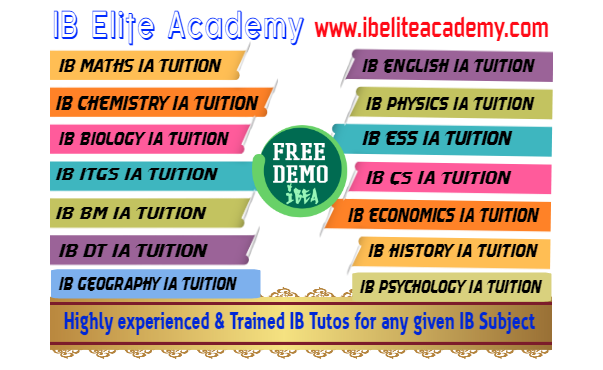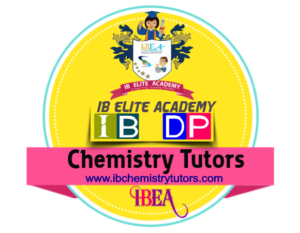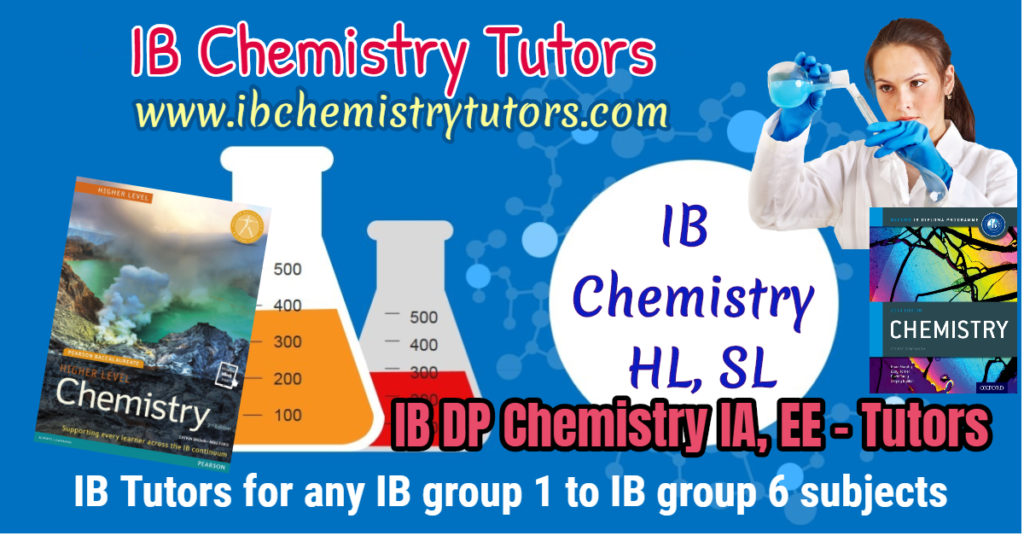IB Chemistry Tutors provide highly experienced and specialized Online IB Chemistry IA Tutors. www.ibiaonlinetutors.com is a specialized unit of IB Elite Academy established to help IB Diploma Internal Assessments, Extended Essay, and Theory of Knowledge. Furthermore, Online IB IA Chemistry Tutors also avail 24’7 online tutoring for lab reports, commentaries, and written tasks. Register now for a FREE 1-hour DEMO SESSION.
provide highly experienced and specialized Online IB Chemistry IA Tutors. www.ibiaonlinetutors.com is a specialized unit of IB Elite Academy established to help IB Diploma Internal Assessments, Extended Essay, and Theory of Knowledge. Furthermore, Online IB IA Chemistry Tutors also avail 24’7 online tutoring for lab reports, commentaries, and written tasks. Register now for a FREE 1-hour DEMO SESSION.
Online IB IA Chemistry Tutors
 Expert and certified Online IB IA Chemistry Tutors for IB Chemistry HL IA Tuition.
Expert and certified Online IB IA Chemistry Tutors for IB Chemistry HL IA Tuition.- Furthermore, we provide topic wise notes both for HL as well as SL Chemistry.
- In addition, we also avail solved past 10 -year papers.
- Highly experienced Online IB Chemistry tutors.
- Assessment through Diagnostic test
- Free 1 hour demo session on the topic of student’s choice based on their convenience
- Periodic developmental and comprehensive assessment
- Access to student and parental portal
- 24/7 tutoring and technical support
- Dedicated Education Manager to take the students through the learning process, smoothly
- Customized lesson plans and worksheets according to student pace and level Sessions delivered through an interactive whiteboard with voice chat and audio enabled.
- Images and lesson plan uploaded online for academic, homework and assignment help
- Option to save the completed tutoring sessions for future revision
- Weekly and monthly meetings with the tutor, student, and the Academic Managers to discuss the progress of the student and take corrective actions for improvement.
IB Chemistry Internal Assessment (IA) HL Tutors.
On www.ibchemistrytutors.com, you will find the best IB Chemistry Internal Assessment (IA) Tutors. The moderation of IB Assessments are generally by external examiners & normally contribute between 20% and 30% of the total grades. On the other hand, some of the arts courses, for example, music, theatre arts, and visual arts have an assessment of a major practical component, which can account for as much as 50% of the total grades.
As most of the IB Elite Academy tutors are Ph.D who are themselves great scholars of international repute. Therefore; these tutors are extremely helpful for IB students to write their Internal and External Assessments. The IB diploma students who take help from our expert and trained online IB IA tutors for their internal and external assessments are able to score high grades. This consequently helps them to get into top-notch universities and colleges across the globe.
Online IB Chemistry Extended Essay
The IB extended essay is an individualistic, self-directed research work of about 4,000-words. Not only we help students with IB internal assessments, but we also help them in their Extended Essay. We have highly experienced, trained, and certified IB EE tutors. The IB EE provides:
- Compose an appropriate research question (RQ) of your interest area.
- Then communicating ideas.
- Finally developing an argument.
IB Diploma Extended Essay Assessment.
The IB examiners carry out the assessment of IB Diploma Extended Essays. Furthermore, it is graded on a scale from 0 to 36.
Finally, the score a student receives relates to a band. The bands are:
- A – work of an excellent standard.
- B – work of a good standard.
- C –work of a satisfactory standard.
- D – work of a mediocre standard.
- E – work of an elementary standard.
Find an expert Online IB IA Chemistry Tutors from India
Here at IB Elite Academy, we proffer experienced and trained Online IB Chemistry online tutors in Delhi NCR (including Gurgaon and Noida). In addition also avail best IB Chemistry home tutors and Online IB Chemistry group tutors in Delhi, Gurgaon, Noida, Mumbai, Bangalore, Pune. www.ichemistrytutors.com and www.onlineibchemistrytutors.com have done thousands of online IB Tuition. As a matter of fact, we have had IB Chemistry students from Singapore, USA, UK, Canada, Australia, New Zealand, Ireland, Singapore, Hong Kong, Dubai. In addition, we have students from the UAE, Saudi Arabia, Bahrain, Malaysia, Bangkok, Philippines, Kuwait, Bangladesh, Sweden, Germany, etc. Furthermore, you can get the best help with Online IB Chemistry IA Tutors at any time.
Uniquely, we provide IB trained chemistry teacher to help IB students with IB Chemistry lab reports instantly with yields guaranteed high results for IB Chemistry Students. We also improve student’s IB Chemistry lab reports by editing in a proper way. We commit to good grades in IB Chemistry internal assessment. Our students have got either 6 or 7 by taking IB Chemistry online tuition all around the world like India, Singapore, Malaysia, Germany, Hong Kong, USA, UK, Canada, Sweden, Switzerland, etc.
Chemistry is one of the Group IV subjects in the IB curriculum. IB Chemistry consists of an internal and external assessment. The internal assessment is based on a number of laboratory practicals while the external assessment consists of three written papers based on the knowledge of the Core syllabus and two selected Options.
Facilitating the individual investigation
Online IB IA Chemistry Tutors help IB Chemistry students (both HL as well as SL) decide upon the most suitable and powerful strategy for facilitating the individual investigation. Furthermore, our Online IB IA Chemistry Tutors help DP chemistry unique Internal Assessment (IA) ideas. As a matter of fact, help IB students with any given IB subject internal assessment. Much of the guidance will, however, be self-evident to experienced teachers. It should be noted that the 10 hours allocated to the individual investigation refers to the time required for the student to plan and implement individual investigative work.
The individual investigation not only allows students to demonstrate their skills in scientific research but, in conjunction with the collaborative group 4 project, also provides a positive opportunity for teachers and students to address meaningfully, and to develop to a significant extent, the five categories of approaches to teaching and learning recognized by the IB that can be found in the “Executive summary” of Approaches to teaching and learning across the Diploma Programme (2012). The five categories are:
- research skills
- communication skills
- thinking skills
- social skills
- self-management skills.
Some of the issues to be addressed when considering how to facilitate the individual investigation so that it becomes a positive opportunity for individual development are:
- whether the student is sufficiently prepared in terms of skills and knowledge to address the investigation in a meaningful and positive manner
- whether sufficient material and human resources are available to support the individual investigations
- how the teacher can ensure that the student works independently in designing, conducting, and reporting the findings of the individual investigation.
These core considerations and other related issues are developed in more detail below.
(a) Scheduling the individual investigation
Teachers should be aware that included in the 10 hours allocated to the internal assessment is:
- the time for the teacher to explain to students the requirements of the internal assessment
- time for consultation between the teacher and each student
- the time to complete the investigative work
- time to review and monitor progress and to check authenticity.
Each school is free to decide which stage of the course is appropriate for carrying out the individual investigation. Questions to be considered when scheduling the individual investigation include the following.
- At which point will key concepts and experimental skills have been taught so that a diverse range of feasible research questions can reasonably be expected to be formulated and investigated by the students?
- Are the available material and human resources sufficient for all students in the class to undertake the individual investigation simultaneously?
- Does the schedule of other DP assessment activities within the school enable students to give sufficient attention and time to the individual investigation?
- How much time will be needed for internal moderation between teachers in the same subject?
- When are the deadlines for the submission of the internal assessment marks and the sample?
(b) Guiding the planning
The initial planning is crucial to the successful outcome of the individual investigation. It is at this stage that the teacher will guide the student as to the appropriateness of the research question in terms of its level of complexity, in order to ensure that it is commensurate with the level of the course and compatible with the assessment criteria. As its title indicates, the individual investigation is personal research and, as such, it is anticipated that each student within a teaching group will undertake his or her own unique investigation of a research question that is of interest. It is important to remember that the formulation of the research question is the student’s responsibility and is assessed within the exploration criterion. Teachers can suggest possible topics and approaches to formulating questions but cannot allocate specific research questions to study.
It might, however, be useful to have outlined the aims of the individual investigation early in the course so that the teacher can then flag up possible productive areas of study as students progress through the course.
Teachers should positively encourage students to explore the full range of options available to them and to pursue a research question that engages their interest. The students should decide whether to do an individual investigation that involves the use of hands-on practical work, secondary sources such as databases and simulations, or a hybrid of all these sources.
(c) Facilitating the investigation
The facilitation of individualized investigations for each student in a teaching group requires forethought and planning. Once again, the optimal strategy depends on school-based considerations. Some of the key factors dictating the final strategy to be implemented are:
- Number of students in the teaching set
- Availability of technical support staff
- The availability of laboratory space
- Access to IT
- The availability of apparatus and materials
To enable more individual attention, and to make limited resources available to more students, it is perfectly acceptable for students to carry out their individual investigations at different times, which means that some may be doing this while the rest of the class is taking part in alternative learning activities.
In those schools that schedule students to carry out their action phase simultaneously, the following recommendations may help.
- Ensure students submit detailed requirements for materials in good time.
- Encourage students to address a wide range of research topics so that there is less demand for the same apparatus and materials.
- Encourage some students to work on investigations based on IT applications and secondary data.
- Promote the philosophy that sophisticated concepts can be meaningfully investigated with simple equipment and methodology.
For investigations using IT applications and/or secondary data, it is important that the students carry out their action phase of data collection or generation under supervision in the classroom or laboratory so that the teacher can guide, monitor and establish authenticity. Such investigations should not be carried out solely as home study.
For students carrying out their investigation as fieldwork, teachers must ensure its authenticity.
(d) Guiding the writing of the report
On completion of the investigation, students should be briefed as to the final requirements of the written report. It would be good practice to:
- revisit the assessment criteria
- remind students that the report is required to be six to twelve pages long
- set a firm interim deadline for submission of their full draft
- set a firm final deadline for the final version.
The report should include sufficient detail for the investigation to be repeated independently.
Once the first full draft is submitted, the teacher is permitted to make general comments and annotations regarding its strengths and weaknesses but these should not be corrections. The work can then be handed back so that students may carry out final drafting.
An authenticity check (using turnitin.com or similar) should be carried out on the final draft to be assessed and the mark submitted via IBIS.
(e) IB Chemistry Internal Assessing the report
Once the student’s report has been finalized, the teacher will assess it using the assessment criteria. It must be emphasized that the criteria and expectations are the same for both HL and SL students.
The individual investigation is internally assessed and externally moderated, meaning the teacher’s assessment should be made clear to the moderator. To this end, the teacher should make sure that each report contains ample evidence of the assessment decisions made, either through comments on a separate mark sheet or annotations on the student’s report, or both.
The work of teachers in the same subject, working with the same cohort of students, should be subject to internal moderation to standardize the school’s assessment prior to the submission of marks.
The final total mark is logged through IBIS and a sample for moderation selected. At this stage, no further amendment to the marking of the report is permitted.



